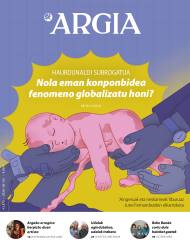Pornography and sexual moralism
Pornography has been the subject of debate for decades and much of the debate has been a moralistic and alarming view of adult society. However, it is time to question this narrow view and to understand pornography from a broader and more precise perspective.
Firstly, pornography is not a new or unique phenomenon in the digital age. Their presence in contemporary society reflects the evolution of sexual attitudes and practices over time. However, the moralist (and sexophobe) view tends to demonize pornography as something harmful or immoral in itself, without recognizing its complexity and diversity.
In addition, the alarmist view of pornography (see latest Emakunde campaign) often fails to take into account that pornography can have different meanings and functions for many people. For some, pornography can be a way to explore sexuality, learn about pleasure and intimacy, or expand the erotic imaginary. However, the moralistic narrative tends to put and stigmatize those who consume pornography in the same bag, regardless of the nuances.
The moralist (and sexophobe) view tends to demonize pornography as something harmful or immoral in itself, without recognizing its complexity
It is also important to recognize that pornography is not harmful in itself, although it can become a problem when consuming uncritical or perpetuating harmful stereotypes about gender, sexuality and the body. But instead of demonizing pornography as a whole, we must opt for a more critical and thoughtful vision that recognises the positive aspects and risks it may have.
This broader view is necessary because the moralistic view of pornography has negative consequences, such as the overload of censorship or the criminalization and pathology of sexually explicit content. This, in addition to limiting sexual freedom and the decision itself, hinders adequate sexual education and the prevention of dangerous sexual behaviors.
It is therefore time to put aside obsolete, simplistic, stigmatizing and prohibitive visions. And to address pornography in a more critical, informed, thoughtful, constructive and painstaking way (also in the educational field).
Bidali zure iritzi artikuluak iritzia@argia.eus helbide elektronikora
ARGIAk ez du zertan bat etorri artikuluen edukiarekin. Idatzien gehienezko luzera 4.500 karakterekoa da (espazioak barne). Idazkera aldetik gutxieneko zuzentasun bat beharrezkoa da: batetik, ARGIAk ezin du hartu zuzenketa sakona egiteko lanik; bestetik, egitekotan edukia nahi gabe aldatzeko arriskua dago. ARGIAk azaleko zuzenketak edo moldaketak egingo dizkie artikuluei, behar izanez gero.
I found the old news on the LIGHT ephemeris channel: On April 23, 1918, Irish workers went on a general strike in I. Against forced recruitment for World War II. Thanks to the response of the workers and independence supporters, Britain was forced to retreat.
We don’t have to... [+]
“Even with all the shortcomings, the unions have done more for humanity than any other human organization that has ever existed. They have contributed more to dignity, honesty, education, collective well-being and human development than any other association of people.” ... [+]
Automatizazioaren eta abereen inguruan kuxkuxeatzen ari nintzela, ukuilu automatizatuen informazioa hasi naiz eskuratzen. Nire idazmahaiaren erosotasunetik idazten, gizakion kontsumorako modu masiboan esplotatzen ditugun abereen bizitzak nahiko penagarriak direla iruditzen zait,... [+]
Errepikatu nirekin: Sara Millerey. Ez dezagun ahaztu bere izena. Transfeminizidioaren biktima da Millerey: gorrototzaile transmisogino batek torturatu zuen, besoak moztu zizkion eta bizirik bota zuen ibaiertz batera. Bi orduko agoniaren ondoren hil zen.
Errazagoa da J.K... [+]
Zenbait urtetatik hona sarri entzuten dugun kontzeptua da zaurgarritasuna. Gaur gaurkoz, diskurtso politikoetan pertsona zaurgarriez aritzea ohikoa da. Seguru nago nik ere inoiz erabili dudala berba hori Bizilan.eus webgunean, eskubide laboralak eta prestazio sozialak azaltzeko... [+]
It seems possible to measure happiness. There are even those who insist on it. The UN is not very successful in maintaining world peace, but it shows in an annual report how such a quality is distributed across the planet. It is basically a list, staggered from country to... [+]
On Sunday, May 11, we have an appointment in the Plaza del Rekalde (Bilbao) to announce that all the people who live in Basque cities and towns have a census. This action is part of a broad campaign that promotes that no one living in our municipalities is without a census. In... [+]
Duela urtebete eskas Espainiako aireportuen sarea kudeatzen duen AENA enpresa publikoak iragarri zuen Loiuko aireportuko terminala handitu nahi duela. 2024an 7 milioi bidaiariren langatik gertu gelditu zen eta, handitzeak aurrera eginez gero, 2030. urtetik aurrera 13-14 milioi... [+]
Rearm Europe. Reindustrialize to defend Europe. This is the agenda that the political leaders of the European Union have been trying to promote lately, through the White Paper on European Defence, the BirArm Europe and the 2030 Availability plans. The excuses for the promotion... [+]
You may not know who Donald Berwick is, or why I mention him in the title of the article. The same is true, it is evident, for most of those who are participating in the current Health Pact. They don’t know what Berwick’s Triple Objective is, much less the Quadruple... [+]
The article La motosierra puede ser tentadora, written in recent days by the lawyer Larraitz Ugarte, has played an important role in a wide sector. It puts on the table some common situations within the public administration, including inefficiency, lack of responsibility and... [+]
Is it important to use a language correctly? To what extent is it so necessary to master grammar or to have a broad vocabulary? I’ve always heard the importance of language, but after thinking about it, I came to a conclusion. Thinking often involves this; reaching some... [+]





















